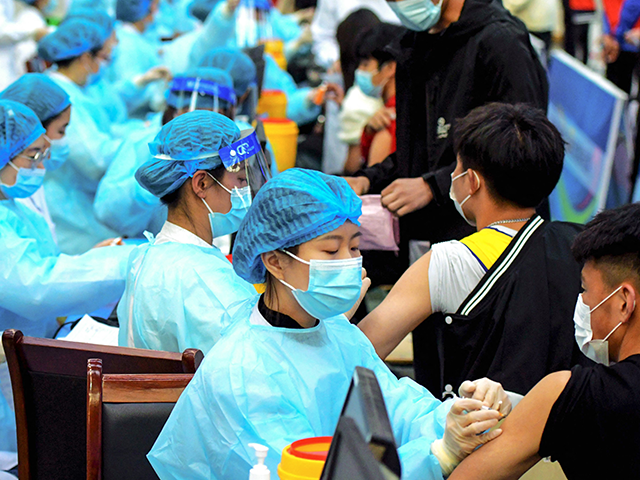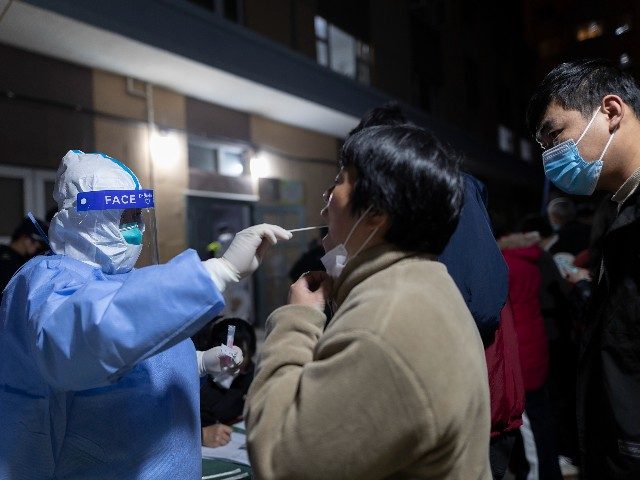China’s nationwide “spike” in domestically transmitted Chinese coronavirus cases in recent days has been largely due to new asymptomatic infections or those contracted by “silent carriers,” China’s state-run Global Times asserted on Friday.
China’s National Health Commission (NHC) recorded 837 domestically transmitted Chinese coronavirus cases on March 9, of which 435 were considered asymptomatic infections.
March 9 marked “the third consecutive day that the Chinese mainland [the legal territory of China] reported daily new infections of over 500,” the Global Times reported, citing Chinese public health data.
While more than half of the new Chinese coronavirus cases registered Wednesday by the NHC allegedly consisted of “silent carriers,” as Beijing describes them, some Chinese regions said their local outbreaks of the disease were comprised of “over 90 percent” asymptomatic infections.
“In some places, asymptomatic cases accounted for over 90 percent of total confirmed cases, which is a major characteristic of the current outbreaks in multiple places,” the Global Times observed on March 11.
The severity of coronavirus cases has often had little impact on what China calls its “zero-Covid” strategy of forcibly locking down neighborhoods, and sometimes entire cities, in response to the coronavirus spread.
Citing the opinions of Chinese public health experts, the newspaper attempted to explain why China’s allegedly asymptomatic caseload for the Chinese coronavirus was so exceptionally high in recent days, writing:
As the Omicron variant is highly transmissible, China has been enhancing the population’s immunity, which could help prevent many from getting infected. However, as the virus continues to mutate, it results in mild or no symptoms, which explains why there are more asymptomatic cases amid current outbreaks.
The Global Times appeared to conclude that China’s record-high new caseload proved the success of Beijing’s stringent measures to contain the disease over the past two years, including the imposition of vaccine mandates on most of China’s population of 1.4 billion.

This photo taken on March 30, 2021, shows a medical staff member (C) administering a dose of the Sinovac Covid-19 coronavirus vaccine at a university in Qingdao in China’s eastern Shandong province (STR/AFP via Getty Images).
“One of the reasons why there are so many asymptomatic infected people is because of mass immunization and the enhanced immunity of the population,” Lu Hongzhou, director of the Third People’s Hospital of Shenzhen, told the publication on March 11.
Chinese leader Xi Jinping has not commented publicly on China’s latest resurgence of the Chinese coronavirus. He has seemingly focused instead on external matters, choosing to issue his congratulations to South Korean President-Elect Yoon Suk-yeol on March 11 for winning South Korea’s latest presidential election on March 9.
The Chinese ambassador to South Korea, Xing Haiming, visited Yoon on March 11 in Seoul, where he personally delivered Yoon a “congratulatory” letter written by Xi Jinping.
In the message, Xi addressed South Korea as a “close neighbor and important cooperation partner,” according to South Korea’s Yonhap News Agency.
“This year is an important year in the bilateral relationship between China and South Korea, as it marks 30 years since our establishment of diplomatic ties,” Yonhap quoted the Chinese leader as saying.
Continuing, Xi wrote:
Together with the South Korean side, the Chinese side is willing to firmly defend the original intentions of our establishment of diplomatic ties and deepen our friendly cooperation to promote the stable and long-term development of the China-South Korea strategic cooperative partnership relationship and bring welfare to the two nations and our peoples.
Responding to the letter, Yoon told Ambassador Xing that “he is certain South Korea-China relations will develop further” under his new presidential administration.

COMMENTS
Please let us know if you're having issues with commenting.